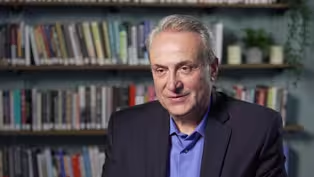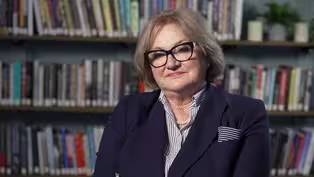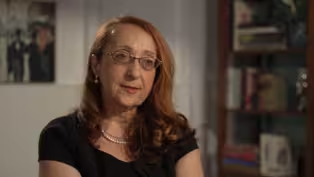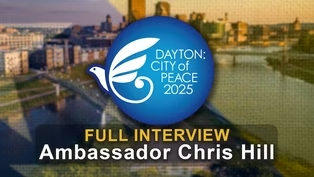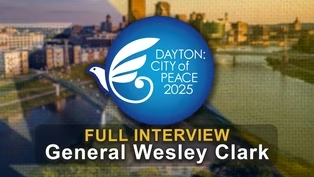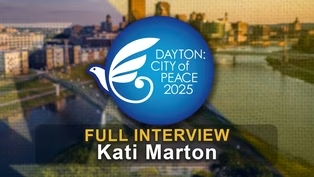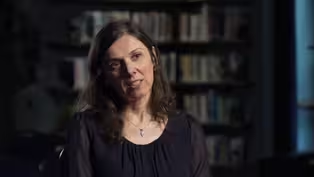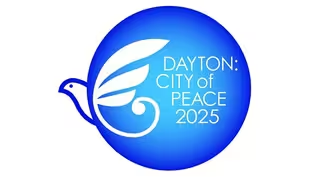
Dayton: City of Peace 2025
Special | 26m 21sVideo has Closed Captions
A look back at the Dayton Peace Accords, nearly 30 years after they ended the Bosnian War.
This special presentation marks the 30-year anniversary of the Dayton Peace Accords as the city of peace welcomes the Spring 2025 NATO Parliamentary Assembly. Featuring commentary and discussion from: local Bosnian refugees, Ambassador Chris Hill, General Wesley Clark, Rep. Michael Turner, Kati Marton, and more. Revisit history, and the role Dayton still plays today in global peace building.
Problems playing video? | Closed Captioning Feedback
Problems playing video? | Closed Captioning Feedback
ThinkTV Originals is a local public television program presented by ThinkTV

Dayton: City of Peace 2025
Special | 26m 21sVideo has Closed Captions
This special presentation marks the 30-year anniversary of the Dayton Peace Accords as the city of peace welcomes the Spring 2025 NATO Parliamentary Assembly. Featuring commentary and discussion from: local Bosnian refugees, Ambassador Chris Hill, General Wesley Clark, Rep. Michael Turner, Kati Marton, and more. Revisit history, and the role Dayton still plays today in global peace building.
Problems playing video? | Closed Captioning Feedback
How to Watch ThinkTV Originals
ThinkTV Originals is available to stream on pbs.org and the free PBS App, available on iPhone, Apple TV, Android TV, Android smartphones, Amazon Fire TV, Amazon Fire Tablet, Roku, Samsung Smart TV, and Vizio.
Providing Support for PBS.org
Learn Moreabout PBS online sponsorshipANNOUNCER: The following program is made possible thanks to generous support from: With additional support from: Thank you.
THOMPSON: Hello and welcome to this special thinkTV.org community program, Dayton: City of Peace 2025.
I'm your host, Ann Thompson, coming to you from studio K in downtown Dayton alongside a wonderful studio audience.
This is a milestone year for the Dayton Peace Accords.
It ended the violent Yugoslav wars in Bosnia and Herzegovina and Croatia.
Starting today, we are revisiting what was at stake and the diplomatic process.
KAURIN: All of us believe war is not coming and does not happen to us.
We are peaceful.
THOMPSON: For Bosnia and Herzegovina immigrants now living in southwest Ohio, the early 1990s were a life altering moment for their families and homeland, turning it from a peaceful, multiethnic nation into this.
Leading up to the bullets and bombs, was a decade long breakup of the former communist Yugoslavia into five countries and the collapse of the USSR.
MARIC: So the nationalism started to grow and rise in a very wrong and negative way that led to hatred, division, killing, bloodshed.
THOMPSON: Member states of the Federation responded, seceding from Yugoslavia.
Slovenia and Macedonia got out without major conflicts, but Croatia and Bosnia became battlegrounds based on ethnic Serb ties and territory.
Serbian leader Slobodan Milosevic was quick to seize control and squeezed the Bosnian government by encircling the capital, Sarajevo, with local and federal forces.
MARIC: Sarajevo was Alli of Sniper Alley.
All city was a sniper alley.
SECIC: More than 13,000 people were killed only in Sarajevo, 1601 children died.
THOMPSON: The war brought centuries of ethnic conflicts to the surface.
Despite a U.N. presence, violence and war crimes would define the regional war, including the murder of 8000 Muslim men and boys at Srebrenica.
MARTON: And at that point, President Clinton and the rest of the world decided this bloodletting has got to stop.
THOMPSON: Leading the way.
President Clinton put diplomat Richard Holbrooke in charge of negotiating peace.
Over ten weeks, his team shuttled across Europe to secure a ceasefire and an end to the war crimes.
CLARK: At first, it took the fact of Milosevic recognizing that his period of military exploitation was ended.
CLINTON: The parties have agreed to put down their arms and roll up their sleeves and work for peace.
THOMPSON: Once a cease fire was signed, a peace conference was arranged bringing the delegations to the secluded Wright-Patterson Air Force Base in Dayton, Ohio.
Holbrooke and negotiators used every tactic to bring the three sides together to create a framework for peace.
CHRISTOPHER: Three weeks ago, the people of the United States welcomed all of us to Dayton and urged that the three Presidents seize this last, best chance for peace in former Yugoslavia.
Today, you will leave Dayton with a comprehensive agreement in hand.
KAURIN: I was so happy there was sign.
People get a freedom and finally we can all of us live together again and go back to their home.
THOMPSON: And while peace returned to Bosnia and Croatia, sustained by NATO forces on the ground, many agree the Dayton Peace Accords were not perfect and were never meant to be a permanent solution.
Now, three decades after the end of the Bosnian conflict, we dive back into the history of the talks and also the role the Dayton community played, and is still playing today, through local efforts and the spring NATO Parliamentary Assembly.
This is Dayton: City of Peace 2025.
Joining me now is our first guest, now serving the city and region in his 11th term in the U.S. House.
He's been an advocate on the Armed Services Committee, as well as serving in top roles on oversight and intelligence.
He is currently the chairman of the U.S. delegation for the NATO Parliamentary Assembly.
Welcome, Congressman Michael Turner.
TURNER: Ann, thank you so much.
THOMPSON: So, Congressman, you were Dayton's mayor at the time, in 1995 when the peace negotiations were going to be starting.
And if you could describe the city as you were going to be thrust into the international spotlight.
TURNER: Well, the world's eyes really were on the conflict that was occurring in Bosnia because of just the atrocities that were occurring.
So our community was certainly aware of what was occurring.
And certainly with Wright-Patterson Air Force Base in our backyard, we were aware of the men and women in our community who every day contribute to the issues of national security, international security.
But we hadn't really been focused on the fact that our base could play such a prominent role in ending a conflict halfway around the world.
When it was selected to do so, you know, you hear today people saying in the reels of it being isolated, but it wasn't really.
It's not really isolated, obviously, but it is self-contained.
So it had an ability for them to come in and conduct the peace negotiations, then in a controlled area.
And with that bring all of the major warring factors together and negotiate what has been a lasting peace.
Although, as the report just indicated, there are portions of the overall peace agreement that were not meant to be lasting governing documents.
They certainly have been lasting peace documents.
THOMPSON: Yes, and we'll talk about that a little bit later.
Well, the city drew global attention as war and peace hung in the balance.
We spoke with Ambassador Christopher Hill, Richard Holbrooke's deputy during the talks, who reflected on the atmosphere and mindset at the base.
Take a look.
HILL: We had high hopes that we would succeed.
I mean, after all, we had prepped it very well and a lot of diplomacy, like good cooking, requires a lot of preparation.
So we're kind of ready for it.
A big issue was what was the shape of the internal map of Bosnia going to look like?
What was the Constitution going to look like?
How we're going to handle issues like international justice.
How is that going to fit in?
Questions like that.
And of course, I mean, the very important aspect was this going to lead the transatlantic relationship stronger or weaker?
We got to Dayton, and I must say, Dayton was a pretty brilliant choice for the whole conference.
It was in the middle America.
I remember Milosevic complaining mightily about it because he thought we were going to do it in New York.
But it was right out there in Middle America with a lot of support for getting this thing done.
So we went right to a meeting and we had all the parties there.
And then we realized, you know, these people are just not going to agree to anything if they sit together.
So then we began a long, arduous process of shuttle diplomacy, is going to one set of hotel rooms and then going to another set, never bringing the parties together until the very end.
And we're very much concerned that it wasn't going to work.
In fact, at one point Ambassador Holbrooke told us to pack all our bags, put them out on the sidewalk, and to try to convince the parties involved that, hey, if they don't get serious, we're going to leave ourselves.
I can't say it really -- that really worked, because they understood correctly that we had a lot engaged in this.
Putting it in the United States was itself a pretty powerful signal that the U.S. really cared about the outcome.
THOMPSON: As Ambassador Hill noted, the base underwent major preparations like converting barracks and building winding paths to keep talks flowing.
Congressman Turner, I'm wondering how the city and community prepared for this historic event.
TURNER: Well, the community responded because they really wanted the negotiations to be successful.
And we obviously weren't going on to the base itself.
There was no spectators role in these peace negotiations, as Ambassador Hill just indicated.
You know, this was a very self-contained process.
They were even trying to keep the various warring factions away from each other.
But our community being a spiritual community and as we now, you know, embrace a city of peace, prayer vigils occurred.
There were symbolic, outside of the base, candle vigils around the base, symbolic efforts to show the people on the base that America, Americans were certainly hopeful for peace.
THOMPSON: Yeah, I'm sure they appreciated that.
And Dayton's presence was felt by the negotiators and heads of state, both on base and off.
Here's a few recollections from folks in the delegation, including General Wesley Clark and Christopher Hill.
CLARK: Well, we were aware of it and it was important.
And people went off post, especially the delegates from the three factions often went off post.
And when they went off post, these billboards were important.
They were also important for this reason, as the negotiations first began, the first meeting with Milosevic, he shows up at the airbase.
There has just been a Newsweek article with his picture on the cover saying like something like "Butcher of the Balkans."
It was a really hostile article.
And he looked at Holbrooke, says, "You did this to me.
You put this on.
You."
And so Holbrooke said, "No, no, I didn't."
Of course, Holbrooke probably did do it.
But Milosevic started with this, you know, antagonistic, hostile view.
And it was hard for the Serb group and our other friends to maintain that when they went off post and saw the tremendous support from the community.
HILL: The most amazing visual to me is the following.
So we got back to the US delegations' hotel rooms, which went down a long corridor.
And so we got in kind of discouraged.
It was after dinner, so it must have been 10:00 or something.
So we go in there and then on the side of this narrow hotel corridor were all these colored pictures, 8x10 pictures that every elementary school kid in Dayton had done with the question being write or do a drawing of what you believe peace looks like.
All these idyllic pictures of what we're aiming for.
And I will never, ever forget that as a sign of what this meant to people in Dayton, both those kids who did that and their teachers who told them to do that, and presumably someone told the teachers to tell the kids to do that.
Amazing.
THOMPSON: Congressman Turner, as the Accords are being signed, I understand that Dayton was making plans to further engage directly with Bosnia and Sarajevo.
Can you speak to the diplomatic and economic engagement efforts with Bosnia shortly thereafter?
TURNER: Well, we knew we would have a role and we knew that outreach would be important.
Dayton had had a history post World War II of having Sister City relationships.
And we thought that that could be a structure within which we could establish relationships.
But also the Clinton White House believed that our community would have a role.
And so I was asked to go to Bosnia after the peace agreement had been signed with the prospect of looking at ways in which we could twin the cities and also look at ways in which our community organization structures could twinned; our hospitals twinned, our chambers twinned, our Philharmonic's twinned.
But for example, USAID under the State Department funded the City of Dayton to use our government to help build some of the democratic institutions for the city of Sarajevo.
For example, our police department trained the homicide detectives as they were standing up the police department in Sarajevo.
Some of those infrastructure, governmental institutions we helped build to help stabilize the democratic institutions in Bosnia.
THOMPSON: Yeah, very interesting.
Well, since 1995, peace has held, but progress remains limited, with a weak central government, rotating trilateral leadership and deep ethnic and political divides, a unified Bosnia still feels somewhat out of reach.
Many we spoke with say the Accords were the best option then, but never meant as a permanent solution.
Take a listen.
JOSEPH: There's still a lot of division in the country, unfortunately, because of the way the country was divided into two entities.
A lot of people still feel that it was done in an unfair way, and we are still dealing with the effects of that.
So it's been difficult to really, truly move on and build a country where everybody feels equally heard and able to build prosperity.
So it is a difficult challenge that we're still dealing with.
HILL: Any lasting solution in Bosnia needed to involve some very deft handling of the various parties.
That is, you had to give something to everybody.
You couldn't have a situation where you have a loser and a winner, and then expect that the loser to accept that situation and go on into the future.
It doesn't work that way.
MARIC: So, I don't believe in wars.
Peace agreement is a good solution, but definitely needs revisions, definitely needs to be worked on.
We need a different concept of Bosnia.
Bosnia that will not be divided, but a Bosnia that will be just one, like it always was, you know.
And we proved before this war that we could live together, and we always did.
THOMPSON: Congressman, you've been a member of the Armed Services Committee and have assessed foreign conflicts and intelligence.
And I'm just wondering, like, all these many years later, what do you make of the Dayton Peace Accords?
TURNER: Well, unfortunately, I do think that we didn't finish the job that we started, both the international community and the United States.
Bosnia really can't do this alone.
The initial structure that was put in place was intended to stop the war and stop the conflict, and it did, but it is not a governing structure.
In order to be one country, it really does need to make that transition.
It's almost virtually impossible internally to be able to accomplish that.
The international community really needed to come together, work with Bosnia to be able to make that transition to one governing from territory boundary to territory boundary, a nationalized state, and both the EU and the United States, we sort of wagged our finger at Bosnia and said, "Internally, you need to resolve this."
And it just really isn't possible without the international community stepping in.
But still, the Dayton Peace Accords hold and the conflict has not occurred.
But I do think that we can play a much stronger role in order to be able to bring back a very workable and the type of governance structure that can take Bosnia into NATO and into the EU.
THOMPSON: And speaking of NATO, let's talk about the fact that they played a huge role in getting the fighting to stop so that negotiations could begin.
You were instrumental in bringing the spring 2025 Parliamentary Assembly session to Dayton in May.
So if you would talk about why Dayton, what kind of preparations were involved, and what's going to be happening over the four days?
TURNER: Sure.
Well, I have served as president of the NATO Parliamentary Assembly, and I currently serve on the board.
And in one of the board meetings they were talking about that they wanted to do something to celebrate the 30th anniversary of the Dayton Peace Accords.
And I said, well, if you're going to do something to commemorate the Dayton Peace Accords, you darn well better be coming to Dayton, Ohio.
But from our community's perspective, one aspect that was important is that I would have hated for this 30th anniversary to pass, and a commemoration of that event to happen somewhere else in the world, or to have it pass without us doing something significant in the community.
And I really thought that if the NATO Parliamentary Assembly came as a foundational structure, that we could build upon that, bring in the international community, build upon that the commemoration of the 30th anniversary, and have something that is, you know, worthy really of reflecting on the event that occurred.
And it looks as if we will be able to do that.
That from the Balkan region, we're going to have heads of state, ambassadors that are all going to be coming.
We're going to have think tanks that are going to be coming in conjunction with the University of Dayton that are going to have a both a retrospective and prospective looking at the issue of how do you end a war?
How do you look at the issue of ending conflict?
How do you, you know, look to progress past the Dayton Peace Accords for the Balkans today, moving forward?
And all of this is going to be very important, and our community is going to play a vital role once again.
THOMPSON: Very interesting.
Well, Dayton is committed to peace by honoring the legacy of the Accords with the Dayton Literary Peace Prize, as one example, with its annual Richard C. Holbrooke Award.
Holbrooke's widow, Kati Marton, sees Dayton's efforts as a reflection of his life's mission.
MARTON: I am so grateful to Dayton for keeping this memory alive, not only because it's partly my husband's memory, but also it's something for Dayton and indeed for America to be proud of.
And I think that Dayton has a really important lesson to teach the rest of the country in what America can and should stand for.
And it's more than telling other people how to behave.
It's behaving with great both humanity and determination.
We live on a really small planet and we can't retreat from that.
THOMPSON: The effort by those receiving those awards is simply incredible.
We're now joined in the studio by two more esteemed guests from the Dayton community, Alice Young-Basora is the executive director of the International Peace Museum, which is located on Ludlow Avenue in downtown Dayton.
And Kevin Lydy is the current chair for the Dayton Sister Cities Committee, which connects our city directly to Sarajevo and Bosnia, as well as a number of other cities across the globe.
Welcome, Alice and Kevin.
LYDY: Thank you.
YOUNG-BASORA: Thank you.
THOMPSON: Alice, if you could tell us how the museum has evolved over the years, and also how does it keep the spirit of the Dayton Accords alive today?
YOUNG-BASORA: Yeah, well, the museum's been around for 20 years.
We just celebrated our 20th year last year.
And our programing is focused on education and collaboration.
But we'd like to highlight the people, the natural peacemakers that have come out of Dayton, like people like Sister Dorothy Stang, Ambassador Tony Hall, Bing Davis, and the people that kind of embodied the spirit of what Dayton is.
And having the Peace Accords having happened here in Dayton are just a natural segue into talking about those people.
And we have just such a wealth of unusual stories.
And the more I talk to people, the more I find those out.
And I found that most people that we talk to have these amazing moments.
And I think it's because we really do have a city that focuses on peace.
THOMPSON: That's great.
Well, Kevin, the Sister Cities organization has done a phenomenal job building global relationships for a long time.
So how do the Peace Accords influence your mission or even open the door to new partnerships?
LYDY: Yeah, the Sister City Committee had been around for a while before the Dayton Peace Accords.
And certainly the Dayton Peace Accords has influenced it.
But I would say that the Peace Accords did a lot more than that, than just influencing the Sister City Committee.
Obviously, getting Sarajevo as a Sister City relationship was a huge outgrowth of the Dayton Peace Accords.
And we've added three more since then.
So we now have a lot of Sister Cities as a result of the Peace Accords.
But it also validated our mission and really expanded it in the sense that we can now expand to other areas around the world.
And we use that as a segue to talk to people and say, you know, "Dayton."
And as soon as you mention Dayton, the Peace Accords almost invariably comes up in topics of conversation.
And it's a great conversation starter, and it's a great way to get those conversations going between two different communities and two different cultures.
THOMPSON: So, I have one final question for all three of you.
And we can start with you, Kevin, and go down the line.
So here we are 30 years after the event and what message do you think it sends to other communities across the US that Dayton, cities like Dayton, can really shape international peace?
LYDY: I think the issue for me is that when people think of middle America they often -- And listen to the reels and talking about how when you talk to international people, America is usually New York or California.
And so middle America seems to kind of be an oversight.
But I think the Dayton Peace Accords showed that even a mid-sized Midwestern city can have a profound impact on international affairs and global peace.
And I think it really sets the tone to say, you know, it doesn't have to be a metropolis.
It can be a smaller town and have great accomplishments.
THOMPSON: Alice?
YOUNG-BASORA: I would agree with that.
I think actually, especially being sort of a smaller town gives us an ability to know each other better and to network better and, you know, to establish those relationships in a different way.
Where bigger cities, you're more anonymous.
And Dayton's very special that way, and so I think it gives us an edge.
THOMPSON: Good.
Congressman?
TURNER: We're getting ready to host a very large international event, and we're only going to be able to do so because everyone in the community is taking a portion and part of it.
And I want to thank thinkTV.org for dedicating this segment to this event and to the Dayton Peace Accords and to, you know, the community's efforts for peace.
Because if you look at everything that's going to happen with the NATO Parliamentary Assembly, you know, all of our universities are taking a piece; University of Dayton, Wright State, Sinclair.
All of our arts organizations, all of our philanthropic organizations, everybody is coming together to do this.
And that really, I think, is what you get in a community of our size where everybody knows each other and works together by all the pieces coming together, you're able to do something large and big.
THOMPSON: Well, there's so much more that we could explore, but we'll have to wrap it here.
Today we shared voices from key Dayton Accords negotiators, community leaders and local refugees who rebuilt their lives in southwest Ohio.
To hear more, visit thinkTV.org or search Dayton City of Peace on the PBS app.
Thanks to all our guests, especially our Bosnia and Herzegovina neighbors, and thank you to the Charles F. Kettering Foundation for their partnership in the creation of this program.
And thank you for watching.
May we all choose peace every day.
Take care.
[applause] CAPTIONS: MAVERICK CAPTIONING CIN OH MAVERICKCAPTIONING.COM With additional support from: Thank you.
Video has Closed Captions
Clip: Special | 5m 54s | Adnan, born in Bosnia and Herzegovina, survived the Bosnian War, before moving to the US. (5m 54s)
Video has Closed Captions
Clip: Special | 6m 27s | Azra, a journalist from Sarajevo, started a successful culinary business in Dayton. (6m 27s)
Video has Closed Captions
Clip: Special | 5m 58s | Dr. Alma, a pediatrician born in Sarajevo, tells her story during the Bosnian War. (5m 58s)
Full Interview: Ambassador Christopher Hill
Video has Closed Captions
Clip: Special | 36m 58s | Amb. Christopher Hill interview, marking the 30th anniversary of Dayton Peace Accords. (36m 58s)
Full Interview: General Wesley Clark
Video has Closed Captions
Clip: Special | 33m 17s | Interview with retired Gen. Wesley Clark on ending the Bosnian War. (33m 17s)
Video has Closed Captions
Clip: Special | 40m 55s | Interview with Kati Marton, widow of Dayton Peace Accords negotiator Richard Holbrooke. (40m 55s)
Video has Closed Captions
Clip: Special | 5m 42s | Meet Irena, an educator whose journey began in Konjic, Bosnia and Herzegovina. (5m 42s)
Dayton: City of Peace 2025 Preview
Video has Closed Captions
Preview: Special | 30s | A new ThinkTV-produced honoring the 30th anniversary of the Dayton Peace Accords. (30s)
Providing Support for PBS.org
Learn Moreabout PBS online sponsorshipSupport for PBS provided by:
ThinkTV Originals is a local public television program presented by ThinkTV
